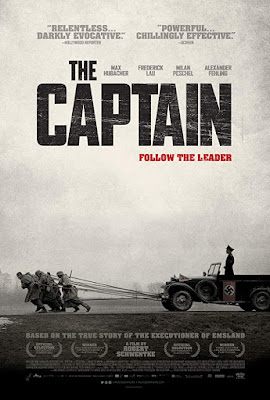Is it possible to create a genuine art film around the themes of revenge and religious fervor? On the basis of COCOTE, the new movie from the Dominican Republic written, directed and edited by Nelson Carlo de Los Santos Arias, the answer is absolutely not. Don't even bother. Of course, another filmmaker might easily manage this combo, but regarding TrustMovies' taste and viewing patience, this may be the worst and most foolish example of pompous, ridiculous movie-making that I have had to sit through in my close to fifteen years of reviewing. It is, in fact, this year's sterling example of a "fart" film (or failed art film: a movie that is mostly comprised of hot, smelly air).
Almost nothing works, and yet almost everything calls heavy-handed attention to itself in Señor de los Santos Arias' bizarre endeavor (the filmmaker is shown at right) -- which alternates black-and-white and color cinematography, a small-screen then wide-screen ratio, a father and a funeral, religion and revenge (with way too much emphasis on the former) to tell a tale that offers barely enough content for a half-hour television segment yet goes on for a punishing 106-minute length. I held on for the entire film (my spouse gave up two-thirds of the way along), but I must admit to growing angrier as time wore on.
The director has certainly cast a striking, handsome and impressive looking actor, Vicente Santos (above and below), in his leading role -- and then deliberately refuses to let us get a very good look at the guy. Few facial close-ups are to be seen, and though much is made of the actor's large stature, don't expect to view him full-frame more than a time or two -- or from such a distance or in such darkness that the figure you're seeing might just be your next-door neighbor. Yes, de Los Santos Arias appears to delight in withholding.
In two of the three scenes (above and below), the filmmaker pulls his camera back about as far from the actors as possible and just lets us hear the dialog so that we'll understand that this is, yes, "art."
We get our lesson on class difference via the rich family for whom our hero works. Absolutely nothing new here (or, for that matter, old that is shown in any depth). Everything about the revenge and the family situation is also offered in such broad strokes that what we learn in this movie makes the Death Wish franchise look deep.
Eventually, something does indeed happen -- hooray! -- and then we get an ending in which, oh, joy!, the filmmaker gets to do his let's-shoot-from-as-long-a-distance-as-possible so the viewer won't know what the fuck is going on. But, come on, guys, it's art!
Do I sound angry? You have no idea. Some of the glowing critical response for this film indicates to me that a handful of my compatriots are so eager to embrace what they see as "new and different" that, once again, the infamous emperor's nakedness goes either unnoticed or unremarked upon.
From Grasshopper Film, in Spanish with English subtitles, Cocote opens this Friday, August 3, in New York City at the IFC Center and in Los Angeles on August 17 at the Laemmle Music Hall 3. To view the half dozen or so playdates, cites and theaters currently scheduled, click here, then scroll down to click on Where to Watch.


























































